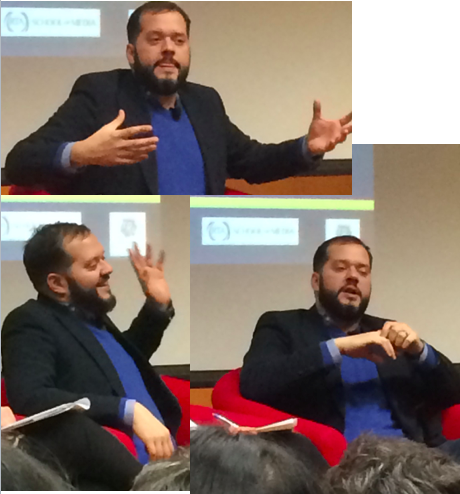 |
| L to R: April Lindgren, Jesse Brown, Greg Elmer |
Brown was interviewed by Ryerson faculty members April Lindgren and Greg Elmer and also took questions from the audience. Heck, I even managed to grab the mike long enough to lob my softball question at the man of the evening. More on that in a bit. Ed. Note: As I was scribbling notes on my lap some of the following are not verbatim quotes, but I stand by them capturing the spirit of what was said tonight. (Don't sue me, ok?)
Jesse Brown on his business model:
I have an aversion to doing things for free. This is not a vanity project about tossing grenades, so I sought a corporate sponsor, and the first guy I approached, from Freshbooks, said sure. He funded me for 6 months. And then when that ran out I went to companies like audible.com who sponsor podcasts, but they only throw a bit of money your way when somebody actually clicks through and signs up for their service so it wasn't enough to cover expenses.
The best sponsor would be a whiskey company because people now know when they come on the show that it's going to be a bit of a confessional. I really should have a two drink minimum.
As for the business model, I had to look at other ways to make this thing sustainable. I didn't want to do a Kickstarter, because that's a one-off lump sum of money. So I decided to use Patreon, where people pledge as little as $1 per month and as much as they want to, and they can quit any time. Within 24 hours I hit a funding level of $1000/month. Within a few week I was up to $4000/month, at which point I pledged to do (the blog and podcast) Canadaland full time. Now (as of late January 2015) I'm almost at $10,000/month and then I'll hire freelancers and will start another podcast, devoted exclusively to politics.
On the popularity of the Canadaland podcast & the Ghomeshi effect:
Pre-Ghomeshi I was getting about 17,000 downloads per week. That then spiked to about 250,000 downloads during the height of the scandal because it was something everybody wanted to know about. Now things have settled down to about 60,000 downloads for the two shows I do per week.
On his beef with media organizations in general, and CBC in particular
There's a sickness in media organizations...a set of rules for the 'stars' and another one for the rank and file. This has been festering for a long time and people want this stuff out. I'm a big supporter of public broadcasting but they (the CBC) have strayed wildly from their mandate. Why are they doing things like streaming music services, trying to compete with Pandora and Songza? And why are they trying to make stars? Strombo is a celebrity we never watched. Ghomeshi was on billboards with shows that weren't successful. It was only later, when they finally found the right platform for him (with "Q") that reality caught up with the manufactured celebrity.
 |
| Screen of my Apple TV and what I see when I click on 'Podcasts' on the menu. Note Jesse's show Canadaland is in the 2nd row, 2nd from left |
Then it was open mike time, and I managed to get in there with my question, which had to do with how I came to know of his podcast. I mentioned that I had been out of Canada for close to 6 years, having returned in the past year, and that this summer I started exploring the podcast menu on my Apple TV and noticed that there was a show, in there with all the CBC and NPR shows, that was new to me so I clicked on it. I listened and it turned out it was a Marc Maron-like one-man show, and I always wondered how somebody without the profile or budgetary resources of the shows from big broadcasters/networks gets 'front paged'.
We tend to think that these things happen via algorithms or something equally cryptic, but in this case, apparently not. Jesse said he just made a point of finding out who was in charge of curating the podcasts for Apple/iTunes and that person was always on the lookout for new and interesting material and agreed to feature Canadaland on the front page of the podcasts menu. "Apple has been very supportive", said Jesse, before pointing out that an exchange student later contacted him after seeking out information about Canada on iTunes and thinking Canadaland was a show with information for newcomers to the country. "The two of us then worked on a story together about how exchange students get screwed when they come to Canada."
Still want to know more?
For a live blog of the event courtesy of www.jsource.ca, click here.
For a feature length interview with Jesse Brown there's this new podcast, devoted to an examination of public broadcasting.
Related Post: When media scandals meet social media
For a live blog of the event courtesy of www.jsource.ca, click here.
For a feature length interview with Jesse Brown there's this new podcast, devoted to an examination of public broadcasting.
Related Post: When media scandals meet social media







